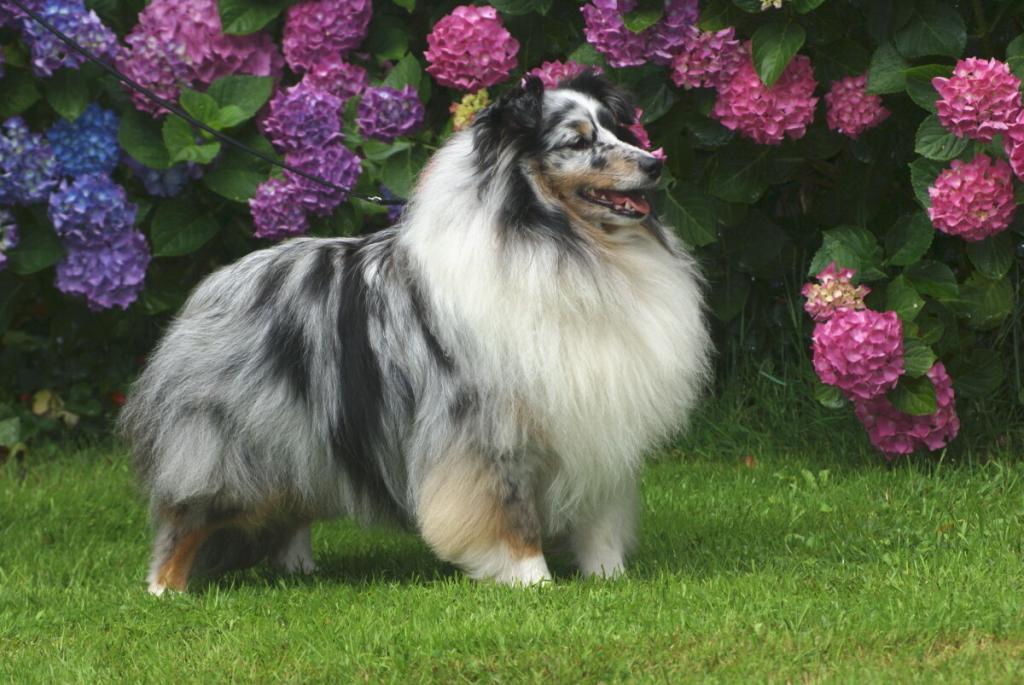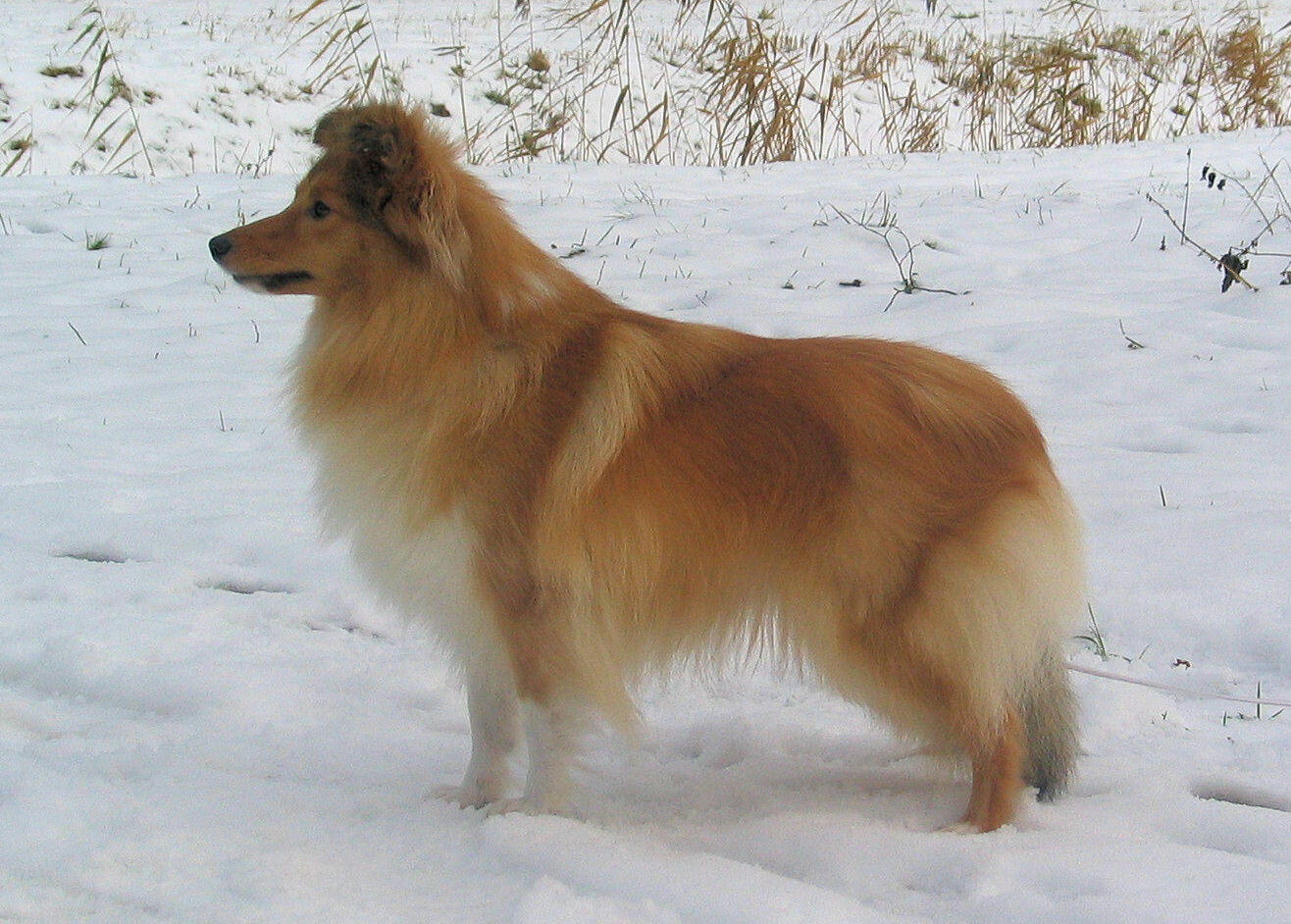You might be surprised to learn that despite their dainty appearance, Shetland Sheepdogs, or Shelties, have a lineage that traces back to the rugged and remote Shetland Islands, where they were bred for herding sheep and ponies.
Their keen intelligence and eagerness to please make them exceptional companions, yet they possess an often overlooked protective streak that belies their smaller size.
Known for their boundless energy and affectionate nature, Shelties can be the heart of your household. Still, they also require a commitment to training and socialization to ensure their vocal tendencies don’t become problematic.
Considering whether this breed’s vibrant personality and distinct needs align with your lifestyle, bear in mind their potential for deep companionship and the challenges their sensitivity may pose in a bustling home environment.
- Noise Level
- Energy
- Sociability
- Trainability
- Care
- Health
Overall
Summary
The Shetland Sheepdog is a moderately noisy breed with high energy levels, excellent sociability, and trainability. They require moderate care and generally have good health.
Shetland Sheepdog: Traits, Temperament, and Care Guide
Regarding the Shetland Sheepdog, often referred to as the Sheltie, its traits and temperament are characterized by an agile and expressive nature, necessitating a comprehensive care guide that addresses its mental and physical needs.
As herding dogs, Shelties possess high energy and are eager to please, which means they need ample exercise and mental stimulation. Due to their feathered coat, regular grooming to prevent matting is crucial.
Early socialization mitigates the risk of timidity and ensures a well-adjusted companion. Be mindful of their sensitivity to stress; a calm environment is paramount. Moreover, be vigilant for any health issues that may arise and require attention.
Your Sheltie’s well-being hinges on a balanced approach to its care.
Exploring the Characteristics of the Shetland Sheepdog
Considering the comprehensive care guide for Shetland Sheepdogs, examining the distinct characteristics defining this animated breed is essential. Shelties are bright, attentive, and known for their soft personality. They’re peaceful with strangers and other animals, yet they may startle easily in environments with frequent tension or loud voices. Regular brushing is imperative due to their lovely feathered coat.
| Trait | Description |
|---|---|
| Herding Instinct | Shelties need mental and physical exercise to satisfy their instinct. |
| Traits and Temperament | They are bright, attentive, and require a peaceful environment. |
| Activity Level | Their agility necessitates an adequate outlet for their energy. |
Shelties, emerging in the early 20th century as family dogs, require careful selection, sufficient exercise, and socialization to thrive within the family unit.
Shetland Sheepdog: A Comprehensive Profile and Guide
As you consider adding a Shetland Sheepdog to your life, it’s vital to understand their comprehensive profile. Analyzing their traits and temperament will equip you with the necessary insights to provide a nurturing environment.
This guide will elucidate the breed’s needs, from mental stimulation to their sensitivity to solitude.
Everything You Need to Know
Diving into the world of Shetland Sheepdogs, you’ll find a breed that combines intelligence, agility, and a friendly disposition, making them an ideal choice for many dog enthusiasts. Originating from the Shetland Islands of Scotland, Shelties were bred for small herding tasks, significantly influencing their breed traits.
- Intelligence: Shelties exhibit a sharp mind, capable of quick learning and problem-solving.
- Agility: Their lithe bodies enable intricate maneuvers, essential for herding exercises.
- Companionship: With a loyal and affectionate temperament, they strive for human connection.
Analyzing the Sheltie dog, you must consider its high exercise needs, which directly result from its herding legacy. A meticulous approach to physical and mental stimulation is crucial for its well-being.
Discovering the Temperament

Understanding the temperament of the Shetland Sheepdog reveals a breed characterized by its agility, intelligence, and gentle nature. As a Sheltie owner, you’re engaging with a proud and animated dog. Their heritage as a herding breed manifests in their swift, light-footed running and graceful jumping abilities.
The Sheltie’s temperament is inherently friendly, promoting a sense of belonging within the family unit and a peaceful coexistence with other animals. Their intelligence shines through during training sessions, where they’re exceptionally attentive and responsive. Employ gentle training methods, as your Sheltie’s sensitivity to harsh tones or sudden movements can be startling.
Regular exercise and early socialization are imperative in nurturing their well-balanced temperament, ensuring they remain confident and well-adjusted companions.
Shetland Sheepdog: Is It a Good Fit for Families?
When considering a Shetland Sheepdog as a family pet, you must evaluate their compatibility with your household’s dynamics and routine.
While they’re generally good-natured and get along well with other pets, Shelties’ sensitivity may not match the unpredictability of young children.
Additionally, your commitment to active engagement and regular grooming is required for their daily mental and physical stimulation, ensuring their well-being in a family setting.
Assessing Shetland Sheepdog’s Compatibility with Families and Kids
If you’re considering a Shetland Sheepdog as a new family member, their gentle disposition and intelligence make them an excellent match for households with children who can respect their sensitive nature. As pet parents, it’s essential to recognize that despite being one of the small breeds of animals, Shelties require:
- Ample opportunities to spend time in mental and physical play, such as games of fetch.
- Environments where young children are always be supervised to ensure gentle interaction.
- Socialization to be comfortable around strangers, reducing potential timidity.
In an analytical view, the Shetland Sheepdog thrives in a family dynamic that nurtures belonging while understanding the breed’s need for a harmonious atmosphere. A Sheltie can be a joyful and devoted addition to your family with the right balance of love and structure.

Sheltie Adaptation Skills
Shelties often adapt well to apartment living, provided they receive sufficient exercise and mental engagement. Initially bred to herd, these dogs possess a work ethic that translates into a need for regular physical and mental stimulation. Despite being a smaller version of the rough Collie, their adaptation skills are remarkable.
Early socialization is crucial to mitigate shyness and build confidence in various environments. They’re sensitive to stress and loud noises; thus, a serene home is vital for their well-being.
Leaving Shelties alone all day may lead to neurotic behaviors, indicating that they require a devoted pack understanding their need for companionship and interaction. First recognized for their herding talents, Shelties now flourish in family settings that are attuned to their exercise needs and emotional sensitivities.
Sheltie Obedience Essentials
As you approach training your Sheltie, you must adopt strategies that leverage their natural intelligence and eagerness to please.
Consistent, positive reinforcement cements desired behaviors and fortifies the bond between you and your dog.
Early socialization and varied, mentally engaging activities lay the foundation for a well-adjusted and obedient Shetland Sheepdog.
Effective Training Strategies
Harnessing the intelligent and eager-to-please nature of the Shetland Sheepdog, effective training strategies are grounded in consistency, positive reinforcement, and early socialization. Remember, every one of these dogs need a structured approach to training. Your first Sheltie might resemble the rough collie in intelligence, but they can become bored without enough exercise and mental stimulation. Dog training should begin early to utilize their natural obedience and to ensure their social skills develop alongside their physical abilities.
Here’s a concise table to delve deeper and ensure your Sheltie thrives:
| Training Focus | Strategy |
|---|---|
| Consistency | Establish a routine and stick with it to reinforce learning. |
| Positive Reinforcement | Use treats and praise to reward good behavior. |
| Socialization | Introduce your dog to various environments and people early. |
| Mental Stimulation | Provide puzzles and new commands to keep them engaged. |
| Physical Exercise | Regular walks and playtime to prevent restlessness. |
Exercise and Grooming Needs
Shetland Sheepdogs require a daily exercise regimen of 20 to 40 minutes to maintain their vigorous energy levels.
Your Sheltie’s exercise and grooming needs are interconnected—their long coat requires regular attention to avoid tangles and matting. Brushing at least two to three times weekly is paramount, with increased frequency during shedding seasons.
Despite their smaller version compared to Shetland ponies, Shelties still possess a hearty constitution suited for cold weather, and their dense coat reflects this heritage.
Engaging your Sheltie in dog sports can satisfy physical and mental exercise requirements, preventing boredom and promoting a well-balanced temperament.
Consistent grooming fortifies the bond with your companion and ensures they remain an integrated, well-groomed family member.

Health Considerations
Turning to health considerations, you must be aware that Shetland Sheepdogs are susceptible to specific health conditions, including hip dysplasia and various eye disorders. A proactive approach with regular veterinary check-ups and a nutritionally balanced diet is essential to manage these risks effectively.
Additionally, their sensitivity to stress underscores the need for a serene home environment to support their mental well-being.
Common Health Issues and Lifespan
While the Shetland Sheepdog typically enjoys a lifespan of 12-14 years, they’re predisposed to certain health issues such as hip dysplasia, thyroid disease, and eye conditions like collie eye anomaly.
As a diligent owner, you’ll want to be vigilant about these health problems to ensure your Sheltie remains healthy and happy. Providing a high-quality and nutritionally balanced diet is essential, as this dog breed thrives with proper care.
Commit to regular grooming, including managing their long double coat to prevent excessive shedding. Recognize the breed’s need for activity; ensure they get their daily exercise.
Is Shetland Sheepdog the Right Dog for You?
Assessing whether a Shetland Sheepdog aligns with your lifestyle and household dynamics is crucial before committing to this sensitive and lively breed. Considering a Sheltie requires thorough research to understand its traits and temperament. These smaller dogs are agile and graceful, needing a balance of mental and physical activity.
At first glance, their feathered coat and gentle nature may seem the perfect fit, but they can be excessively vocal and startle easily, which may not suit a noisy environment or a home with small, energetic children.
To help you find the right dog, consider whether you can provide a calm, stable setting where a Sheltie thrives. Shelties need around-the-clock engagement to prevent shyness or fearfulness, demanding considerable time and patience.
Alternatives for Shetland Sheepdog: Intelligent and Loyal Medium-Sized Herding Breeds
Explore these breeds if you appreciate the Shetland Sheepdog’s intelligence and loyalty, which are perfect for those who value alert and devoted medium-sized herding dogs.
| Similar Dogs | Short Description |
|---|---|
| Collie | Famous for its intelligence and grace, great for herding and as a family companion. |
| Australian Shepherd | A versatile and energetic breed, great for herding and dog sports. |
| Border Collie | Highly intelligent and athletic, excellent for herding and agility sports. |
| Welsh Corgi | A compact breed with a strong herding instinct and playful nature. |
| Belgian Tervuren | A breed known for its intelligence and versatility in various dog sports and roles. |
Conclusion
In conclusion, as a Sheltie owner, you’re embracing a breed that excels in obedience—with a remarkable 85% of them mastering new commands in less than a month.
However, this intelligence demands your commitment to regular mental stimulation and exercise. Carefully weigh the breed’s needs against your lifestyle to ensure a harmonious match.
Remember, the Shetland Sheepdog isn’t just a pet; it’s a sensitive companion that thrives on attentive care and interaction.